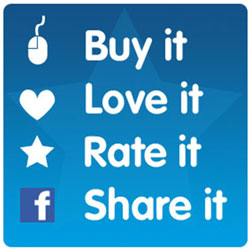For decades, consumers depended on marketers to help them decide whether a product was a good purchase or not...
If the product delivered on the marketing message, the product was bought time and again. It became habit. The other big convincer was a brand name.
This picture has changed dramatically over the past few years. Take the Asus success story as an example:
When Jonney Shih was chair of Asus, the company still manufactured computers and video game consoles for other companies. It was during this tenure that Shih decided Asus should develop and sell laptops under its own brand name.
Colleagues thought Shih was crazy to even suggest this. They didn't think Asus could compete with all the other big brands available on the market. But Shih ignored them and pushed forward with his vision.
The gamble paid off. In 2007, an Asus-branded computer was released and it received stellar reviews. Consumers rushed to the stores to get their hands on the computer. By 2012, Asus was the world's fifth-best-selling brand of PC.
How did Shih know his venture would be a success? He recognised that with the growing availability of opinions from experts and users, the importance of a brand name had diminished.
Consumers now made their purchasing decisions with the help of reviews and recommendations from peers. The numbers speak for themselves...
90% of consumers say their buying decisions are influenced by online reviews
This was the finding of a survey done by Dimensional Research in 2013. The reviews referred to in this instance are positive ones, but negative reviews have a huge impact on how shoppers spend their money too. More than 80% of respondents indicated that negative reviews make them less likely to open their wallet. If a negative review is what a consumer notices on a website first, the chance of a transaction happening is slim.

(Image sourced from bigw.com)
Naturally, consumers do not seek out the opinions of others on every product they're interested in buying. Reviews are more likely to be consulted when the investment made by the consumer is great, like in the case of electronic items or cars. Still, when reviews are consulted, it does not take reading many for the consumer to make up their mind. Research, done by Bright Local, revealed that nearly 70% of consumers read no more than six reviews before making a decision.
Seeing as opinions found online are regarded as highly as recommendations made by family and friends, it's no surprise that consumers consult so very few reviews at a time. In fact, sometimes the information consumers gain about brands come from those close to them, as many consumers turn to their personal social media profiles when they want to praise or criticise a product or service.
Does this mean that marketers can do no more than sit back and watch how consumers determine what happens to their brand? It most certainly does not. The key is to take advantage of online reviews and make them work in the brand's favour.
Making reviews work for the brand
In order to take back some of the control in the online space, marketers must generate positive reviews and quash negative reviews:
Generating positive reviews: If a customer indicates in person or over the phone that they had a good experience doing business with you, ask if they'd mind adding a review on the company's website. Many people would not mind, as it's a simple task that takes no longer than a few minutes. The returns will be great, as it has been proven that consumers trust reviews more than product descriptions generated by a brand or company.
Quashing negative reviews: Address complaints and grievances aired in reviews, and do it as soon as possible after a review is posted. Showing that customers and their opinions matter, will raise the company's profile with both existing and potential customers. Don't forget to ask those customers who leave the conversation happy if they'd be willing to change their complaint into a compliment online.
These processes are an important part of Online Reputation Management (ORM) and, as such, they never end. Reviews have to be constantly monitored, on the brand's own site and everywhere else it's referenced. Deal with negative reviews in ways that instil trust - don't just delete them and never fake positive reviews to push negative ones down. Consumers and Google are becoming smarter by the day and both will have no qualms about dropping your brand when your actions are discovered. There are many who'll be more than willing to take your place.








































